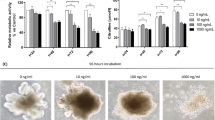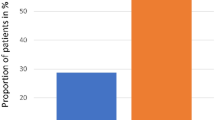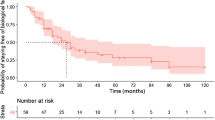Abstract
Oral and/or intestinal mucositis is a severe complication of hematopoietic SCT. Keratinocyte growth factor (KGF) has proven activity in the prevention of oral mucositis. We examined the efficacy of KGF in the prevention of intestinal mucositis. From January 2006 until December 2007, 35 consecutive patients underwent autologous SCT (auto-SCT) in our institution. A total of 15 consecutive patients who underwent auto-SCT from March 2007 to December 2007 received KGF for the prevention of mucositis and were included in the study group A, whereas 20 consecutive patients treated from January 2006 to March 2007, were included in the historical control group B. Oral and intestinal mucositis were significantly less severe in group A (P=0.002 and P<0.001, respectively). These results were confirmed with the use of video-capsule endoscopy. Patients in group A had a significantly lower incidence of neutropenic fever (P=0.026). Severe intestinal mucositis was significantly associated with a higher incidence of documented infections too (P=0.019). KGF is effective in the prevention of intestinal mucositis in patients undergoing auto-SCT. Patients with severe intestinal mucositis run a higher risk to develop infections.
This is a preview of subscription content, access via your institution
Access options
Subscribe to this journal
Receive 12 print issues and online access
$259.00 per year
only $21.58 per issue
Buy this article
- Purchase on Springer Link
- Instant access to full article PDF
Prices may be subject to local taxes which are calculated during checkout


Similar content being viewed by others
References
Bellm LA, Epstein JB, Rose-Ped A, Martin P, Fuchs HJ . Patient reports of complications of bone marrow transplantation. Support Care Cancer 2000; 8: 33–39.
Stiff PJ, Emmanouilides C, Bensinger WI, Gentile T, Blazar B, Shea TC et al. Palifermin reduces patient-reported mouth and throat soreness and improves patient functioning in the hematopoietic stem-cell transplantation setting. J Clin Oncol 2006; 24: 5186–5193.
Balzan S, de Almeida Quadros C, de Cleva R, Zilberstein B, Cecconello I . Bacterial translocation: overview of mechanisms and clinical impact. J Gastroenterol Hepatol 2007; 22: 464–471.
Sonis ST, Oster G, Fuchs H, Bellm L, Bradford WZ, Edelsberg J et al. Oral mucositis and the clinical and economic outcomes of hematopoietic stem-cell transplantation. J Clin Oncol 2001; 19: 2201–2205.
Ruescher TJ, Sodeifi A, Scrivani SJ, Kaban LB, Sonis ST . The impact of mucositis on alpha-hemolytic streptococcal infection in patients undergoing autologous bone marrow transplantation for hematologic malignancies. Cancer 1998; 82: 2275–2281.
Lark RL, McNeil SA, VanderHyde K, Noorani Z, Uberti J, Chenoweth C . Risk factors for anaerobic bloodstream infections in bone marrow transplant recipients. Clin Infect Dis 2001; 33: 338–343.
Elting LS, Cooksley C, Chambers M, Cantor SB, Manzullo E, Rubenstein EB . The burdens of cancer therapy. Clinical and economic outcomes of chemotherapy-induced mucositis. Cancer 2003; 98: 1531–1539.
Hill GR, Ferrara JL . The primacy of the gastrointestinal tract as a target organ of acute graft-versus-host disease: rationale for the use of cytokine shields in allogeneic bone marrow transplantation. Blood 2000; 95: 2754–2759.
Finch PW, Rubin JS . Keratinocyte growth factor/fibroblast growth factor 7, a homeostatic factor with therapeutic potential for epithelial protection and repair. Adv Cancer Res 2004; 91: 69–136.
Blijlevens N, Sonis S . Palifermin (recombinant keratinocyte growth factor-1): a pleiotropic growth factor with multiple biological activities in preventing chemotherapy- and radiotherapy-induced mucositis. Ann Oncol 2007; 5: 817–826.
Hughes WT, Armstrong D, Bodey GP, Bow EJ, Brown AE, Calandra T et al. 2002 Guidelines for the use of antimicrobial agents in neutropenic patients with cancer. Clin Infect Dis 2002; 34: 730–751.
Miller AB, Hoogstraten B, Staquet M, Winkler A . Reporting results of cancer treatment. Cancer 1981; 47: 207–214.
Brennan MT, von Bultzingslowen I, Schubert MM, Keefe D . Alimentary mucositis: putting the guidelines into practice. Support Care Cancer 2006; 14: 573–579.
Triantafyllou K, Dervenoulas J, Tsirigotis P, Ladas SD . The nature of small intestinal mucositis. A video-capule endoscopy study. Accepted for publication in Support Care Cancer 2008; e-pub ahead of print.
Spielberger R, Stiff P, Bensinger W, Gentile T, Weisdorf D, Kewalramani T et al. Palifermin for oral mucositis after intensive therapy for hematologic cancers. N Engl J Med 2004; 351: 2590–2598.
Meropol NJ, Somer RA, Gutheil J, Pelley RJ, Modiano MR, Rowinsky EK et al. Randomized phase I trial of recombinant human keratinocyte growth factor plus chemotherapy: potential role as mucosal protectant. J Clin Oncol 2003; 21: 1452–1458.
Sonis ST . Is oral mucositis an inevitable consequence of intensive therapy for hematologic cancers? Nat Clin Pract Oncol 2005; 2: 134–135.
Sonis ST, Elting LS, Keefe D, Peterson DE, Schubert M, Hauer-Jensen M et al. Perspectives on cancer therapy-induced mucosal injury. Cancer 2004; 100 (Suppl 9): 1995–2025.
Diaz MA, Vicent MG, Madero L . High-dose busulfan/melphalan as conditioning for autologous PBPC transplantation in pediatric patients with solid tumors. Bone Marrow Transplant 1999; 24: 1157–1159.
Jo JC, Kang BW, Jang G, Sym SJ, Lee SS, Koo JE et al. BEAC or BEAM high-dose chemotherapy followed by autologous stem cell transplantation in non-Hodgkin's lymphoma patients: comparative analysis of efficacy and toxicity. Ann Hematol 2008; 87: 43–48.
Wang EH, Chen YA, Corringham S, Bashey A, Holman P, Ball ED et al. High-dose CEB vs BEAM with autologous stem cell transplant in lymphoma. Bone Marrow Transplant 2004; 34: 581–587.
Argiris A, Seropian S, Cooper DL . High-dose BEAM chemotherapy with autologous peripheral blood progenitor-cell transplantation for unselected patients with primary refractory or relapsed Hodgkin's disease. Ann Oncol 2000; 11: 665–672.
Caballero MD, Rubio V, Rifon J, Heras I, García-Sanz R, Vázquez L et al. BEAM chemotherapy followed by autologous stem cell support in lymphoma patients: analysis of efficacy, toxicity and prognostic factors. Bone Marrow Transplant 1997; 20: 451–458.
Farrell CL, Bready JV, Rex KL, Chen JN, DiPalma CR, Whitcomb KL et al. Keratinocyte growth factor protects mice from chemotherapy and radiation-induced gastrointestinal injury and mortality. Cancer Res 1998; 58: 933–939.
Gibson RJ, Keefe DM, Clarke JM, Regester GO, Thompson FM, Goland GJ et al. The effect of keratinocyte growth factor on tumour growth and small intestinal mucositis after chemotherapy in the rat with breast cancer. Cancer Chemother Pharmacol 2002; 50: 53–58.
Brauchle M, Madlener M, Wagner AD, Augermeyer K, Lauer U, Hofschneider PH et al. Keratinocyte growth factor is highly overexpressed in inflammatory bowel disease. Am J Pathol 1996; 149: 521–529.
Lutgens L, Lambin P . Biomarkers for radiation-induced small bowel epithelial damage: an emerging role for plasma citrulline. World J Gastroenterol 2007; 13: 3033–3042.
Shapira M, Adler SN, Jacob H, Resnick IB, Slavin S, Or R . New insights into the pathophysiology of gastrointestinal graft-versus-host disease using capsule endoscopy. Haematologica 2005; 90: 1003–1004.
Author information
Authors and Affiliations
Corresponding author
Rights and permissions
About this article
Cite this article
Tsirigotis, P., Triantafyllou, K., Girkas, K. et al. Keratinocyte growth factor is effective in the prevention of intestinal mucositis in patients with hematological malignancies treated with high-dose chemotherapy and autologous hematopoietic SCT: a video-capsule endoscopy study. Bone Marrow Transplant 42, 337–343 (2008). https://doi.org/10.1038/bmt.2008.168
Received:
Revised:
Accepted:
Published:
Issue Date:
DOI: https://doi.org/10.1038/bmt.2008.168
Keywords
This article is cited by
-
Intestinal barrier functions in hematologic and oncologic diseases
Journal of Translational Medicine (2023)
-
Systematic review of growth factors and cytokines for the management of oral mucositis in cancer patients and clinical practice guidelines
Supportive Care in Cancer (2020)
-
Italian consensus conference for the outpatient autologous stem cell transplantation management in multiple myeloma
Bone Marrow Transplantation (2016)
-
GWAS of 972 autologous stem cell recipients with multiple myeloma identifies 11 genetic variants associated with chemotherapy-induced oral mucositis
Supportive Care in Cancer (2015)
-
Palifermin reduces infection rate and hyperfibrinogenemia in patients treated with high-dose chemotherapy based on beam or BU-thiothepa
Bone Marrow Transplantation (2014)



